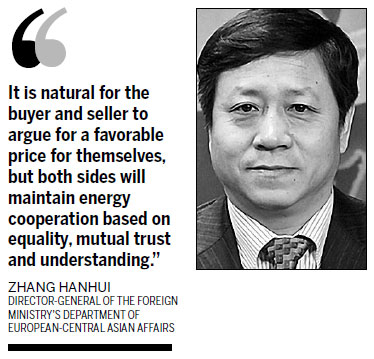China to boost Central Asia energy ties
Updated: 2012-01-13 07:00
By Zhao Shengnan (China Daily)
|
|||||||||||
BEIJING - China will continue to expand energy ties with Central Asian countries, which have proven to be a fruitful model of mutually beneficial cooperation, a senior Chinese diplomat said on Thursday.
 |
Zhang Hanhui, director-general of the Foreign Ministry's Department of European-Central Asian Affairs, said the Central Asian economy showed strong momentum last year with 7 percent growth in GDP, and cooperation between nations in the region and China has great potential to be upgraded to a new level.
Chinese energy enterprises have participated in oil and gas development in Kazakhstan, Turkmenistan and Uzbekistan, he said.
China and Turkmenistan signed agreements in July 2007 under which the Central Asian nation would supply 30 billion cubic meters of gas to China annually through pipelines for 30 years.
In November, Turkmen President Gurbanguly Berdymukhamedov said that Turkmenistan plans to expand its natural gas supply to China to 65 billion cu m annually via pipelines.
The gas is shipped through the China-Central Asia pipeline, which originates in Turkmenistan and goes through Uzbekistan and Kazakhstan before connecting with China's second west-east gas pipeline, which starts in the Xinjiang Uygur autonomous region and ends in Hong Kong, with a total length of 8,704 km.
The Central Asian economy has recovered to the pre-crisis level, Zhang said, adding that progress has been made toward regional integration between Central Asia and Russia.
The Customs Union of Belarus, Kazakhstan and Russia, free trade area agreements in the Commonwealth of Independent States, and Russia's accession to the World Trade Organization will further deepen and broaden regional economic cooperation, he said.
China-Russia energy cooperation also made groundbreaking achievements, including an oil pipeline linking Russia's Far East and Northeast China that became operational at the beginning of 2011.
It is expected to transport 15 million tons of crude oil from Russia to China by the end of 2012, and 300 million tons over the next 20 years, Zhang said.
However, the two countries have failed to reach a final agreement on a natural gas supply deal due to differences over pricing.
"It is natural for the buyer and seller to argue for a favorable price for themselves, but both sides will maintain energy cooperation based on equality, mutual trust and understanding," he said.
China and Russia also boosted cooperation in areas such as nuclear power and aerospace, he added.
Official figures show China's trade with Russia, Kazakhstan, Kyrgyzstan, Tajikistan and Uzbekistan reached $86.8 billion in 2010, up more than sevenfold compared with 2001.
Kazakhstan has always advocated equal and mutually beneficial cooperation with Russia and China, said Konstantin Syroezhkin, chief researcher at the Kazakhstan Institute for Strategic Studies.
China-Russia trade increased from about $8 billion in 2000 to nearly $56 billion in 2010, and China is now Russia's biggest trading partner.
China and Russia face similar tasks in the future, focusing on domestic reform and development, said Pang Dapeng, an expert on Russian politics with the Chinese Academy of Social Sciences.
As big neighboring countries, both countries have to strengthen cooperation in a bid to realize these important tasks, he said.
China Daily
Today's Top News
President Xi confident in recovery from quake
H7N9 update: 104 cases, 21 deaths
Telecom workers restore links
Coal mine blast kills 18 in Jilin
Intl scholarship puts China on the map
More bird flu patients discharged
Gold loses sheen, but still a safe bet
US 'turns blind eye to human rights'
Hot Topics
Lunar probe , China growth forecasts, Emission rules get tougher, China seen through 'colored lens', International board,
Editor's Picks

|

|

|

|

|

|





